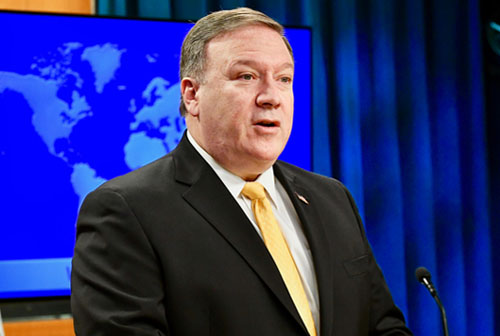by WorldTribune Staff, April 10, 2019
The Trump administration will soon present a Mideast peace plan “to resolve a problem that’s been going on for decades and decades that previous administrations couldn’t solve,” U.S. Secretary of State Mike Pompeo said on April 9.
Testifying before a Senate subcommittee, Pompeo declined to respond when Democrats asked him to back a two-state solution: “Ultimately the Israelis and Palestinians will decide how to resolve this,” he said.

President Donald Trump’s aides Jared Kushner and Jason Greenblatt will soon lay out the peace plan, which has come to be known as the “Deal of the Century.”
“We’re hopeful that we have some ideas that are different, unique, which will allow the Israelis and the Palestinian people to come to a resolution of the conflict,” Pompeo said.
While the plan has not yet been made public, Kushner recently discussed it in an interview with Sky News in Arabic.
While Kushner did not get into many specifics, he did say the plan “is very detailed and will focus on delineating the border and providing solutions to the main issues.” The current edition of Geostrategy-Direct.com features a report published in Lebanon with detail of the plan provided by regional sources.
Related: ‘Deal of the century’: Beirut report details secret Trump peace plan, April 9, 2019
The Palestinian Authority insists that a two-state solution is the only solution to the decades long conflict with Israel, but Trump has not committed to that solution.
Meanwhile, Pompeo said the notion from some Democrats and their followers in the corporate media that the State Department has been “hollowed out” under the Trump administration is “not factually based.” Pompeo made the comment during an April 10 Senate Foreign Relations Committee hearing at which he presented State’s Fiscal Year 2020 budget.
“When I became the Secretary of State, I promised I would put diplomacy at the forefront of defending U.S. national security to give State its swagger back. I think we’ve made a lot of progress,” Pompeo said.
Pompeo said that the Trump administration is requesting $40 billion for the State Department for FY 2020.
Pompeo, who became secretary of state on April 26 of last year, told the committee:
“When we took office, we inherited the most complex set of threats that the United States of America has faced since World War II.
“We faced a China that was turning toward authoritarianism, turning away from market liberalization, and turning the screws on its minority populations in a truly Orwellian fashion.
“We faced an Iranian regime that, flush with cash from the nuclear deal, set about seeding terror from Yemen to Syria to Lebanon and beyond.
“We faced a Russia that felt no compunction about invading Ukraine, seizing Crimea, meddling in our elections, and breaking arms-control treaties.
“We faced a North Korea that continued to pursue its nuclear and missile proliferation threats to our nation.
“And we faced a terror threat that was more deadly and stretched across a far wider geography.
“What did we do?
“First, the Trump administration recognized and faced reality. We know we can’t make sound policy based on wishful thinking. We can’t lead from behind.
“We leveled with the American people and our friends and partners about the threats that we face, individually and collectively. This honesty produced growing bipartisan consensus on Capitol Hill about the need to confront Chinese aggression.
“It produced a unanimous consensus inside of NATO that arms-control agreements like the INF Treaty are worthless if only one party adheres to their terms. It produced international support for the brave people of Venezuela.
“Basing policy on reality, we recognized Jerusalem as Israel’s capital. We recognized Israel’s sovereignty over the Golan Heights. It’s why the State Department designated the Islamic Revolutionary Guard Corps as a terror organization on Monday. It’s just a simple recognition of reality.
“Second, we used creative diplomacy to build coalitions to confront our enemies. We know we can’t – nor should we – do everything ourselves.
“We convinced our NATO allies to spend more on their own defense. We rallied the Defeat ISIS coalition to dismantle the caliphate in Iraq and Syria. We convened over 60 countries in Warsaw to discuss common threats and shared opportunities in the Middle East – and that included both Arab and Israeli leaders talking to each other. We’re getting our Middle East Strategic Alliance off the ground. And we have built out an Indo-Pacific strategy to do a true pivot to Asia.
“We’ve supported our hemispheric partners in the OAS and the Lima Group as they work to support the Venezuelan people. And we’ve forged a global coalition at the United Nations to impose the toughest-ever sanctions on the Democratic People’s Republic of Korea.
“So what’d we get? Third, what are the outcomes? This administration promised to dismantle the caliphate and we’ve done it. We promised to confront China for its unfair trade practices and call them out on human rights violations. We’ve done that, too. We promised to exit the Iran nuclear deal to exert pressure on Tehran to change its murderous ways. Still more work to do.
“We’re working every day to protect our citizens at home and abroad, advance American prosperity and values, and support our allies and partners overseas.
“Here’s what we’ve done. It’s been 11 months and a couple weeks now,” Pompeo said. “I lifted the hiring freeze, both on our team and employee family members. This was a no-brainer, taking 2,000 talented people and putting them back in the workforce.
“We reinstituted promotion rates for the Foreign Service. We’ll have more Foreign Service officers by the end of this calendar year than ever in the history of the United States of America. The notion that we’ve been hollowed out is simply not factually based. New Foreign Service Officer and Foreign Service Specialist classes are being admitted. Fifty-five senior leaders have been confirmed by the Senate.”
Your Intel Brief: Geostrategy-Direct __________ Fix The Media Now
